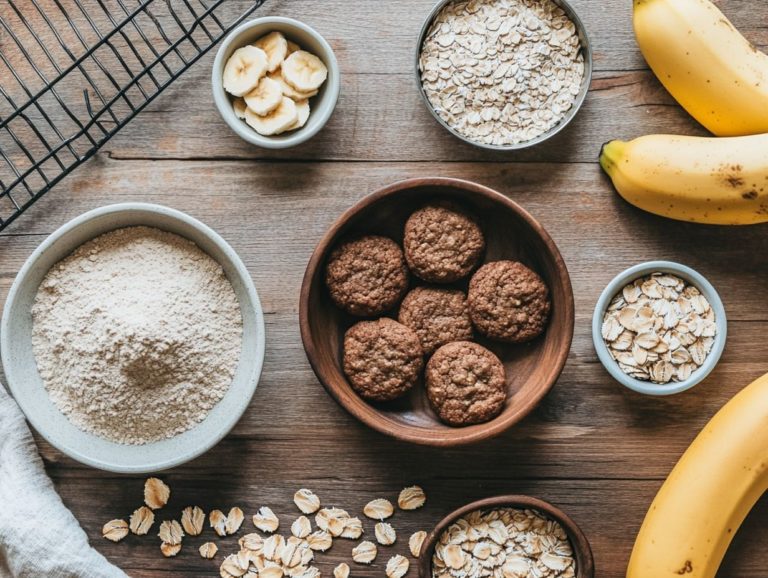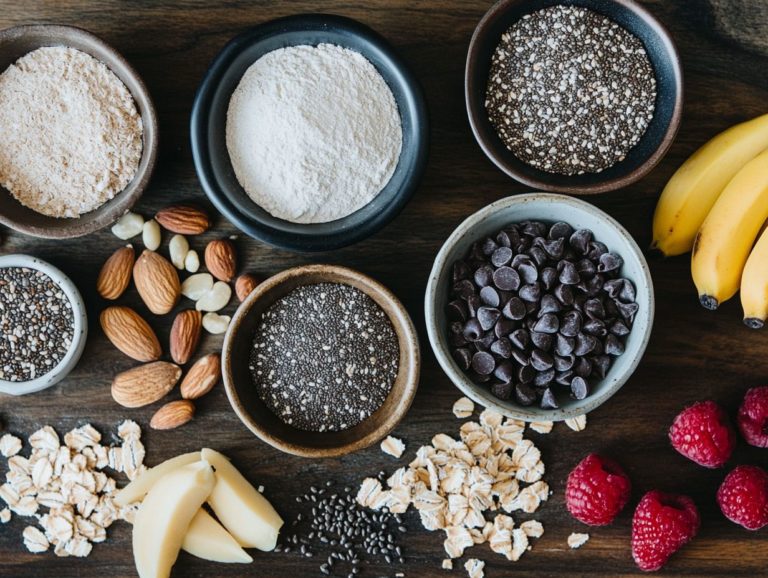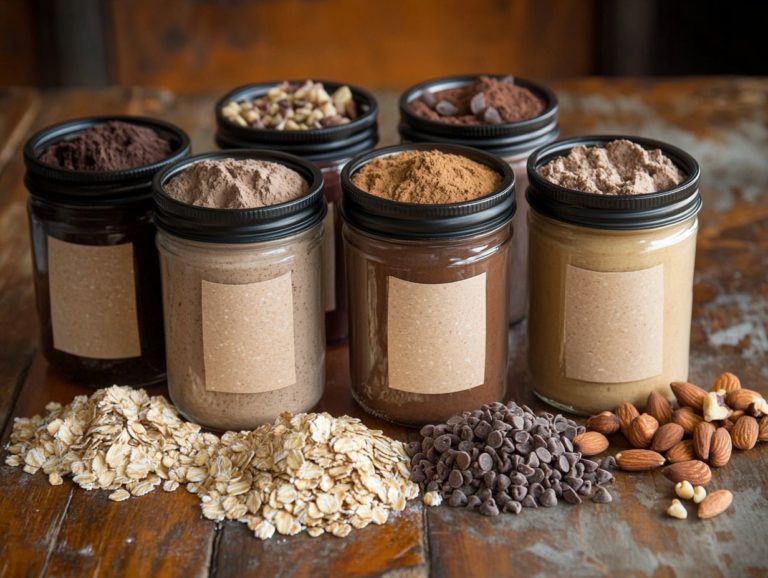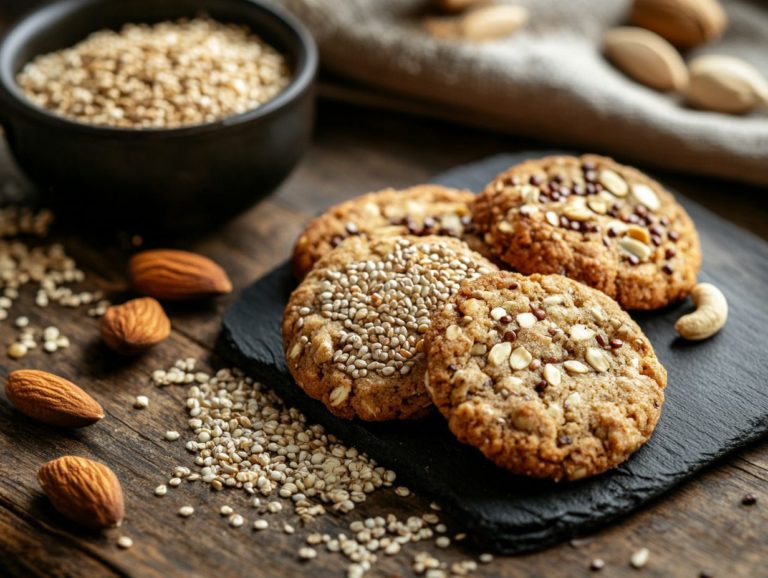Plant-Based Cookies: A Healthier Dessert Option
As a cookie enthusiast in search of healthier dessert options, you’ll find that plant-based cookies, such as vegan cookies, are gaining traction as a delightful alternative to conventional recipes.
These healthy cookies are not only brimming with nutrients but are also typically lower in saturated fat and sugar. They satisfy your sweet cravings while contributing positively to your overall well-being.
This article delves into the nutritional distinctions between plant-based and traditional cookies, highlighting their health benefits and guiding you on how to effortlessly create your own at home with easy recipes. Uncover enticing flavors and indulge in the joy of baking a wholesome treat, such as chewy cookies or breakfast cookies!
Contents
- Key Takeaways:
- Health Benefits of Plant-Based Cookies
- 3. May Help with Weight Management
- 4. May Reduce Risk of Chronic Diseases
- How Are Plant-Based Cookies Made?
- 1. Using Alternative Flours and Sweeteners
- What Are Some Popular Plant-Based Cookie Flavors?
- How Can You Make Your Own Plant-Based Cookies at Home?
- Frequently Asked Questions
- What are plant-based cookies, and are they also considered vegan cookies?
- Why Are Plant-Based Cookies Considered a Healthier Dessert Option Compared to Traditional Snacks?
- Are All Plant-Based Cookies Vegan?
- Do Plant-Based Cookies, Including Vegan Cookies, Taste Different from Traditional Cookies?
- Can I Substitute Plant-Based Cookies for Regular Cookies in Baking Recipes?
- Are There Any Health Benefits to Eating Plant-Based Cookies?
- Conclusion
Key Takeaways:
- Plant-based cookies are a healthier alternative to traditional cookies as they are lower in saturated fat and cholesterol and may have added nutritional benefits.
- Adding plant-based proteins and nutritious mix-ins, such as walnuts and flax seeds, can boost the nutrient content of plant-based cookies and may help with weight management and reducing the risk of chronic diseases.
- Making your own plant-based cookies at home is easy and fun with a variety of popular flavors to choose from, like chocolate chip, peanut butter, oatmeal raisin, snickerdoodle, and coconut.
Health Benefits of Plant-Based Cookies
Opting for plant-based cookies instead of traditional ones presents an array of health benefits tailored to various dietary preferences, including lower sugar and higher fiber content. These delectable treats are crafted from wholesome ingredients such as almond flour, oats, and almond meal, complemented by natural sweeteners like dates and bananas. Not only do they satisfy your cravings, but they also elevate your energy levels and provide immune-boosting benefits.
In contrast to traditional cookies, which are often loaded with refined sugars and unhealthy fats, these nutritious alternatives use healthy fats from ingredients like nut butter, almond butter, and ground flax. The result? A delicious, chewy texture that delights any cookie enthusiast. Plus, they are perfect for a post-workout snack.
These plant-based options can be easily adapted to be gluten-free, making them a perfect choice for those with gluten sensitivities.
What Are the Nutritional Differences Between Plant-Based and Traditional Cookies?
The nutritional differences between plant-based cookies and traditional cookies are quite striking, especially regarding fiber, healthy fats, and low sugar. Traditional cookies often lean heavily on refined white flour and excessive sugar, while plant-based cookies embrace nutrient-rich ingredients like almond flour, oats, and natural sweeteners such as dates and bananas. This combination not only boosts their fiber content but also keeps sugar levels in check, making them a smart snack choice.
These ingredient choices not only enhance the nutritional profile but also significantly impact your overall health, including your heart health and digestion. For example, traditional cookies can pack in over 10 grams of sugar per serving, causing those quick energy spikes followed by crashes that leave you craving more sweets. On the flip side, plant-based cookies can contain as little as 2-3 grams of sugar, thanks to the natural sweetness of their components.
With fiber content soaring to over 5 grams in some plant-based options, digestion is supported, and you’ll feel fuller for longer helping to curb those excessive snacking urges. Plus, the healthy fats found in ingredients like nut butters provide sustained energy levels. Choosing plant-based cookies can be a smarter strategy for balancing energy and effectively managing cravings, especially with popular add-ins like dark chocolate chips.
Are Plant-Based Cookies Vegan?
Plant-based cookies are inherently vegan, crafted without any animal products and relying solely on plant-derived ingredients. Common staples in these cookies include almond butter, oats, and natural sweeteners like dates and bananas. This not only ensures that they are nutritious but also delicious, perfectly aligning with a vegan lifestyle.
The distinction often comes down to your individual dietary choices and the quality of the ingredients used. While all plant-based cookies adhere to vegan guidelines, not every vegan cookie prioritizes whole-food ingredients.
You might find that the allure of a vegan cookie is significantly enhanced by optional add-ins such as dark chocolate chips, crunchy nuts, or even coconut flakes. These additions deepen the flavor and boost the nutritional value, offering fiber, healthy fats, and an overall delightful snack experience.
With these versatile options, you can indulge in a delightful dessert that caters to your moral, health, and taste preferences. These cookies are a favorite for everyone, perfect for any occasion.
What Are the Health Benefits of Plant-Based Cookies?
Plant-based cookies present a wealth of health benefits, making them an excellent option for those who prioritize nutritious snacking, such as post-workout snacks or quick energy boosters. Packed with essential nutrients and antioxidants, these cookies support overall health and enhance your immune system.
By including wholesome ingredients such as oats, flax seeds, and nuts, plant-based cookies contribute to effective weight management and may even lower the risk of chronic diseases like diabetes and hypertension. This makes them a savvy choice to incorporate into your diet.
1. Rich in Nutrients and Antioxidants
Plant-based cookies are a treasure trove of essential nutrients and antioxidants, which play an important part in enhancing your overall health and well-being. Ingredients such as oats and flax seeds are brimming with vital vitamins, minerals, and dietary fiber that support your body s optimal functions.
The addition of nuts and seeds introduces a delightful crunch while providing healthy fats, protein, and an extra dose of fiber. Take almonds, for example; they offer vitamin E, a powerful antioxidant that helps protect your cells, and can be easily incorporated into the recipe.
Chia seeds are another stellar choice, as they are a type of healthy fat that is good for your heart and packed with omega-3 fatty acids. Let s not forget about dark chocolate chips, rich in flavonoids, another type of antioxidant known for its ability to combat oxidative stress in your body.
Together, these ingredients work wonders for your heart health, improve digestion, and sustain your energy levels. This makes plant-based cookies an undeniably smart and delicious choice for snacking at any time of the day.
2. Lower in Saturated Fat and Cholesterol
One of the standout advantages of plant-based cookies is that they are typically lower in saturated fat and cholesterol compared to traditional cookies. By choosing ingredients like almond butter and oats, you can enjoy healthy fats that contribute to heart health and provide fiber without the downsides of high cholesterol levels.
This shift toward healthier components enhances the nutritional profile and supports a balanced lifestyle. For example, swapping out refined sugars for dates or applesauce can significantly reduce sugar content while adding a delightful natural sweetness.
The incorporation of nut flours and seeds introduces a wealth of nutritious elements, including fiber and omega-3 fatty acids, both beneficial for cardiovascular health and enhancing the texture of the cookies.
By embracing these wholesome ingredients, plant-based cookies become more than just a guilt-free treat; they play a crucial role in promoting your overall well-being and reducing the risk of chronic diseases. They are an excellent choice for anyone who is health-conscious.
3. May Help with Weight Management
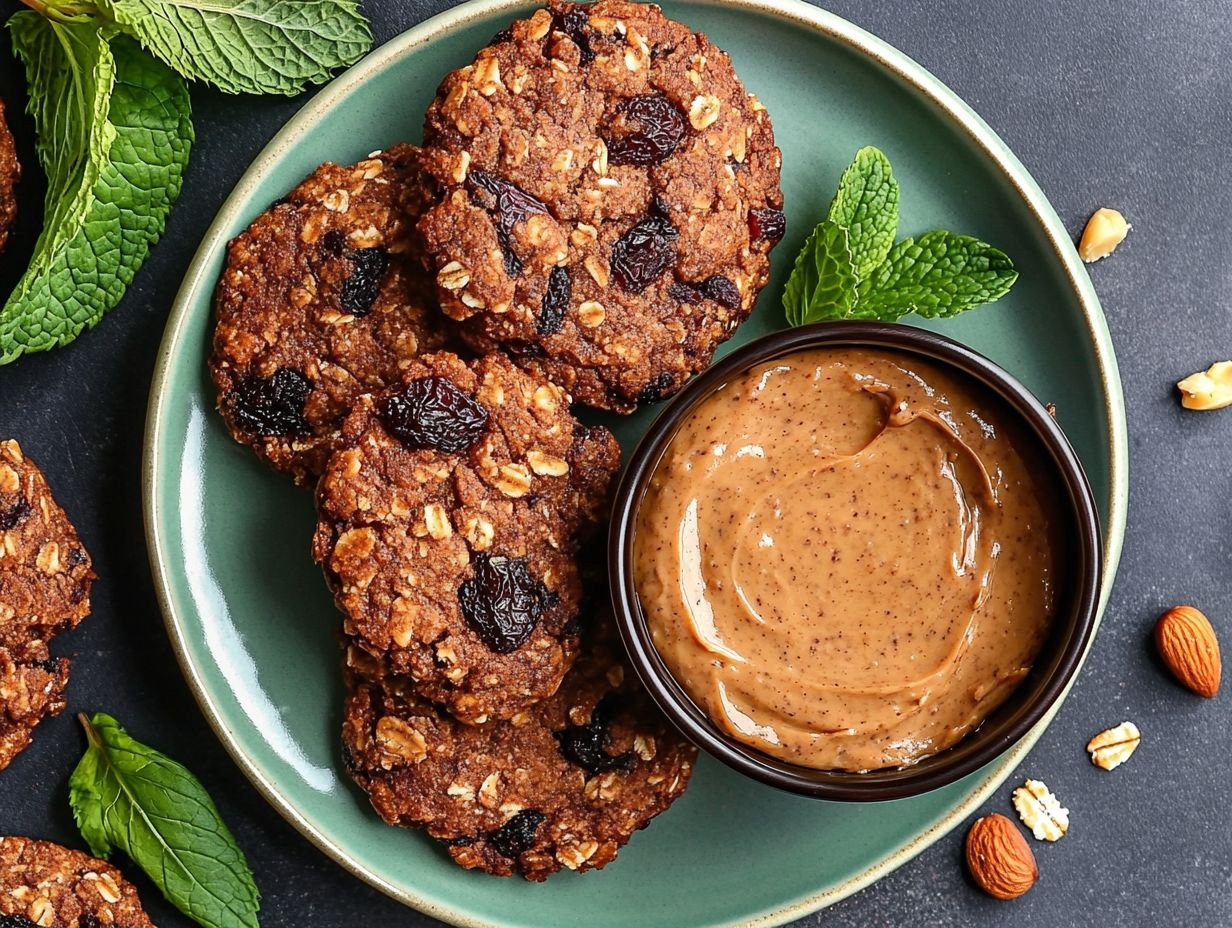
Plant-based cookies can be a valuable ally in your weight management journey thanks to their higher fiber content and nutritious ingredients. With oats, flax seeds, and other whole food components in the mix, these cookies help keep you feeling full longer. This makes it easier to resist unhealthy snacks and maintain a balanced diet, contributing to effective weight management.
By incorporating these fiber-rich delights into your daily routine, you can curb cravings and promote better portion control, making them an ideal snack. For example, enjoying a plant-based cookie as a mid-morning snack or post-workout treat can help keep your energy levels steady while satisfying your sweet tooth.
To amplify their satiating effects, pair these tasty treats with protein-rich foods like nut butter or yogurt to enhance their nutritional value. Meal planning with these cookies promotes healthier choices throughout the week, allowing them to fit seamlessly into your nutritious eating plan without compromising on enjoyment, especially during breakfast or as snacks.
4. May Reduce Risk of Chronic Diseases
Consuming plant-based cookies can be a delightful way to lower the risk of chronic diseases, thanks to their rich in nutrients and impressive antioxidant properties. Regularly including foods high in antioxidants and healthy fats in your diet, such as plant-based cookies, can improve heart health and decrease the chances of developing conditions like diabetes and hypertension.
These cookies often feature ingredients like oats, which are abundant in soluble fiber that helps lower cholesterol and boost heart health. Nuts and seeds, packed with omega-3 fatty acids, provide anti-inflammatory benefits that combat heart disease. Even dark chocolate chips, when enjoyed in moderation, offer valuable antioxidants that can enhance cognitive function and reduce oxidative stress, making them a great optional add-in.
Selecting ingredients like flaxseeds for their lignans and chia seeds for their omega-3 content allows you to create delicious cookie treats that not only satisfy your cravings but also support your overall wellness. Indulging in plant-based cookies becomes a delightful step toward embracing a healthier lifestyle.
How Are Plant-Based Cookies Made?
Creating plant-based cookies is an elegant endeavor that invites you into the realm of wholesome baking. Begin by selecting a mixing bowl or food processor to blend your chosen ingredients, such as almond flour and oats.
The fundamental steps involve harmoniously combining elements like almond flour, oats, and rich chocolate chips. Once your mixture is ready, place it on a baking sheet and allow your cookies to bake to perfection, transforming simple ingredients into a delightful and nutritious treat that satisfies both the palate and the spirit.
1. Using Alternative Flours and Sweeteners
When you create plant-based cookies, incorporating alternative flours like almond flour or coconut flour can truly elevate their texture and nutritional profile. Choosing natural sweeteners such as dates or ripe bananas adds sweetness while also boosting the cookie’s fiber content.
These flours bring a delightful nuttiness and superb moisture retention, resulting in a chewy consistency that traditional wheat flour simply can t match. Both almond and coconut flours are gluten-free, making them perfect for anyone with gluten sensitivities, while delivering essential nutrients like healthy fats and protein. These wholesome options ensure that your cookies are rich in fiber and low in sugar.
Opting for natural sweeteners instead of refined sugar lowers the glycemic index, helping you manage blood sugar levels, and introduces unique flavors that can transform your cookie experience. This combination allows you to indulge without guilt, turning a simple treat into a wholesome snack that nourishes your body and delights your taste buds.
2. Incorporating Plant-Based Proteins
Incorporating plant-based proteins into your cookies not only elevates their nutritional profile but also supports muscle recovery, particularly if you are on the hunt for that perfect post-workout snack. Ingredients like almond butter and ground flax seeds bring in protein while delivering healthy fats and fiber that your body craves. These plant-based ingredients make for a delicious and nutritious addition to your dessert or snack routine.
By replacing traditional flour with protein-rich alternatives like chickpea flour or adding protein powders derived from peas or brown rice, you can transform these delightful treats into powerful allies for your diet. As a fitness enthusiast, you will quickly discover that these cookies full of nutrients not only assist in muscle repair but also help maintain your energy levels throughout the day.
Throw in ingredients like chia seeds or hemp hearts, and you will boost the omega-3 fatty acid content, promoting heart health in the process. These thoughtful adjustments cater perfectly to your active lifestyle, offering you a satisfying way to indulge while staying true to your health goals.
3. Adding Nutritious Mix-ins
Flavorful Options
When you add nutritious mix-ins like chocolate chips, walnuts, and flax seeds to your plant-based cookies, you are not just elevating the flavor; you are also boosting their health benefits. These optional add-ins enhance the taste while providing a wealth of nutrients, including omega-3 fatty acids and antioxidants.
Consider incorporating ingredients such as dried fruits, oatmeal, or even shredded coconut to diversify the texture and taste profile of your cookies. For example, raisins or cranberries can offer a sweet burst of flavor while supplying essential vitamins and minerals. Adding almonds or pecans brings a delightful crunch and is a great source of healthy fats and protein, making your cookies even more satisfying.
Health Benefits
These nutritious mix-ins can also include walnuts and flax seeds for an added boost of omega-3 fatty acids and antioxidants. Do not shy away from experimenting with unique options like chia seeds or pumpkin puree. These ingredients not only amplify the nutritional value of your cookies but also introduce an intriguing complexity that can elevate your entire baking experience. The possibilities are truly endless when it comes to crafting delectable, plant-based treats!
What Are Some Popular Plant-Based Cookie Flavors?
Dive into some of the most popular plant-based cookie flavors that are sure to delight your taste buds, such as:
- classic chocolate chip
- rich peanut butter
- hearty oatmeal raisin
- delightful snickerdoodle
Each of these options presents a distinctive flavor profile, catering to a variety of palates. The beauty of these flavors lies in their adaptability; they can be seamlessly transformed into plant-based recipes that deliver on taste, quality, and nutrition, allowing you to enjoy delectable treats without any compromise. Don’t miss out on trying these delicious flavors that everyone is raving about!
1. Chocolate Chip
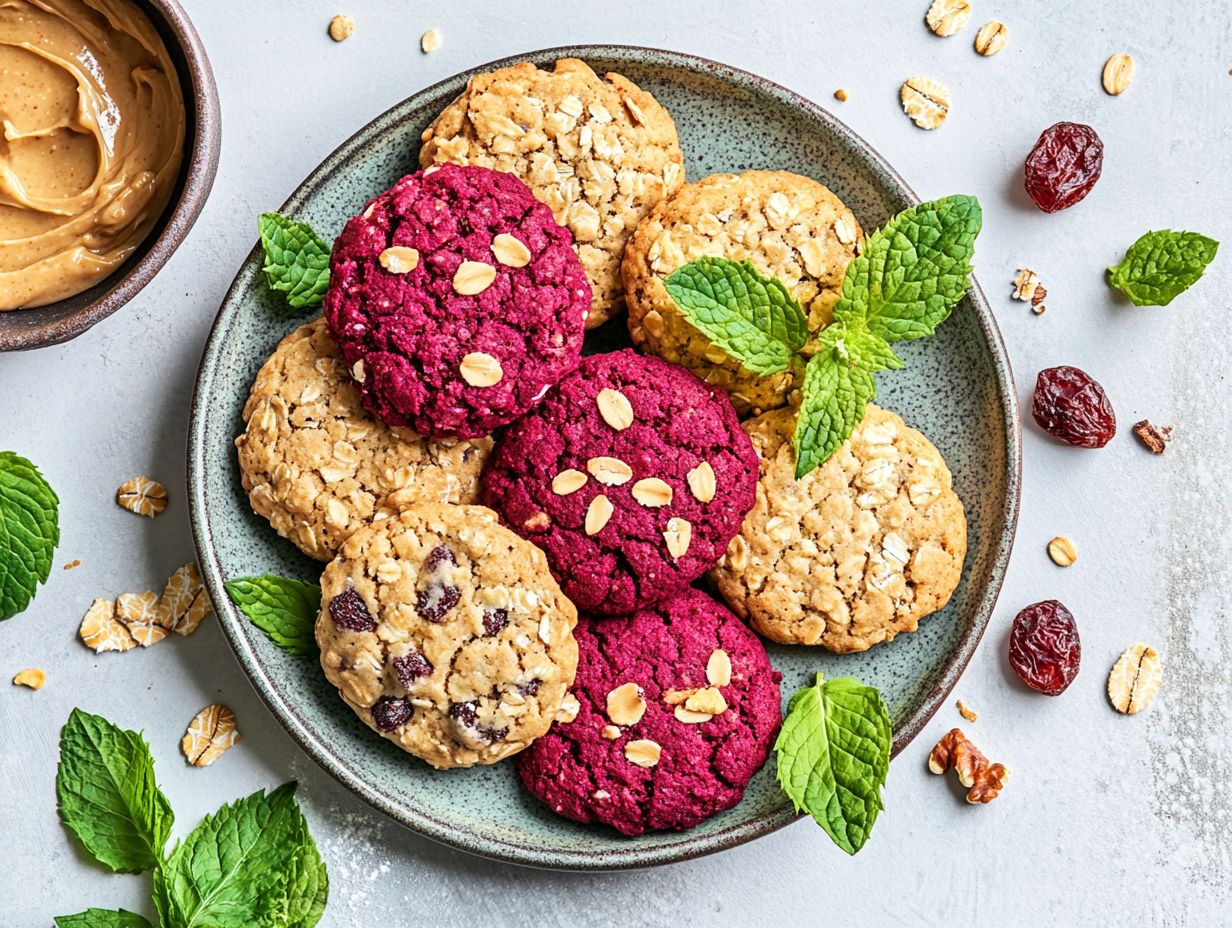
Chocolate chip cookies are a classic indulgence, and you will be pleased to know that plant-based versions can be just as delightful and satisfying. By opting for dairy-free chocolate chips and wholesome ingredients such as almond flour and oats, you can achieve that iconic flavor while keeping things vegan-friendly. These vegan cookies can be easily customized to your taste preferences.
If you have a penchant for that rich, buttery taste, consider experimenting with plant-based butters derived from coconut or shea. These can provide a creamy, indulgent base that beautifully complements the sweetness of the chocolate.
Incorporating natural sweeteners like maple syrup or agave nectar will elevate the flavor profile without overshadowing the traditional essence of the cookie. A splash of vanilla extract can also work wonders, unifying the ingredients and creating that nostalgic aroma we all adore. For an additional layer of richness, consider adding a swirl of nut butter or a sprinkle of coconut flakes.
With these thoughtful modifications, you can savor a batch of freshly baked cookies that not only delight your palate but also align with your dietary preferences.
2. Peanut Butter
Peanut butter cookies are a cherished favorite, celebrated for their rich, nutty flavor and delightful chewy texture. When you opt for plant-based peanut butter cookies using natural peanut butter and minimal sugars, you create a delicious and healthy alternative to traditional recipes.
These delightful treats do more than satisfy your cravings. They provide a solid dose of protein and healthy fats, making them an ideal snack choice. When crafting your plant-based version, consider swapping refined flour for whole grain or gluten-free alternatives to enhance the cookie’s nutritional profile, and explore the benefits of choosing plant-based cookies for even healthier options.
Incorporating ingredients like oats or chia seeds can elevate the fiber content. Natural sweeteners such as maple syrup or date syrup add a touch of sweetness without overwhelming the cookie with sugar. The result is a wholesome creation that aligns with a conscious lifestyle, appealing to those who seek enjoyable treats.
3. Oatmeal Raisin
Oatmeal raisin cookies present a hearty, wholesome flavor profile that beautifully complements the chewy texture of oats and the sweetness of raisins. You can create a plant-based version by using rolled oats, coconut sugar, and flax seeds, resulting in a healthy and satisfying cookie.
These changes keep the cookies delicious and full of flavor while catering to your vegan preferences. For instance, swap traditional butter for a rich, creamy vegan alternative or incorporate applesauce to retain moisture while adding a hint of natural sweetness.
Adding spices like cinnamon and nutmeg enhances the warmth of these treats, making them even more comforting. Opting for dairy-free chocolate chips or crunchy nuts elevates the cookie’s complexity and texture, ultimately delivering a delightful experience that satisfies both your palate and dietary needs.
4. Snickerdoodle
Snickerdoodle cookies are celebrated for their soft texture and delightful cinnamon-sugar coating, making them an irresistible treat. You can create plant-based snickerdoodles using almond flour and natural sweeteners, ensuring they are just as delicious while adhering to vegan principles.
To maintain that signature flavor profile, it s essential to incorporate rich, buttery alternatives like coconut oil or vegan butter. These ingredients provide a similar mouthfeel that enhances the overall experience. A hint of cream of tartar adds that characteristic tanginess, while a dash of nutmeg beautifully complements the spice blend.
Consider adding a touch of plant-based milk to ensure the cookies have perfect moisture levels. By choosing high-quality plant-based ingredients, you can enjoy a delectable balance of sweetness and warmth that captures the cozy essence of traditional snickerdoodles. For those looking for a nut-free option, plant-based cookies make this delightful treat accessible to those embracing a plant-based lifestyle.
How Can You Make Your Own Plant-Based Cookies at Home?
Creating your own plant-based cookies at home is an exciting endeavor and an opportunity for customization and creativity that transforms your kitchen into a personal bakery. These cookies can be made as a healthy snack or even a delicious dessert.
By sourcing a trusted recipe and selecting high-quality, wholesome ingredients, you can effortlessly craft cookies that perfectly align with your taste preferences and dietary requirements. Consider using ingredients like almond meal, coconut flour, and flax seeds to boost the nutritional value of your cookies.
Start your plant-based baking adventure today and enjoy delicious homemade cookies!
1. Find a Recipe
Start by searching for an easy recipe that matches your dietary needs. Watching a recipe video can also be helpful to better understand the cooking techniques involved.
Finding a great recipe is your first step to making delicious plant-based cookies. It provides essential ingredient ratios and baking times. You’ll discover a wealth of online resources brimming with cookie recipes, spanning from the timeless chocolate chip to more adventurous flavor profiles, including healthy cookie options. For inspiration, check out the rise of plant-based cookies in the dessert world.
An abundance of food blogs, cooking websites, and social media platforms like Instagram and TikTok showcase an array of vegan cookie recipes tailored to various skill levels and taste preferences. Cookbooks dedicated to plant-based baking often serve as treasure troves filled with mouthwatering recipes, including easy options for beginners.
When selecting a recipe, it’s crucial to consider your personal taste. Whether you lean towards chewy, crispy, or even unique flavor combinations can greatly influence not only your baking success but also the sheer enjoyment of the process.
2. Gather Ingredients
Once you ve chosen a recipe, gathering all the essential ingredients becomes paramount for successful baking. Common ingredients for plant-based cookies often include almond flour, oats, chocolate chips, and natural sweeteners like dates or bananas. Don t forget to check for optional add-ins like walnuts or ground flax seeds to boost the nutritional value.
This meticulous preparation is key to ensuring your cookies turn out just as you envision, delivering the perfect texture and flavor. Try using plant-based butter, almond butter, or coconut oil for a rich taste and proper binding of the ingredients.
Feel free to explore variations by adding nuts or seeds for an extra crunch, or by switching up the sweeteners to suit your personal preferences. Maple syrup or agave nectar can offer a delightful twist in sweetness. By experimenting with these components, you can create a unique interpretation of classic recipes, such as breakfast cookies or snack options, satisfying diverse palates while staying true to a plant-based approach.
3. Follow Instructions
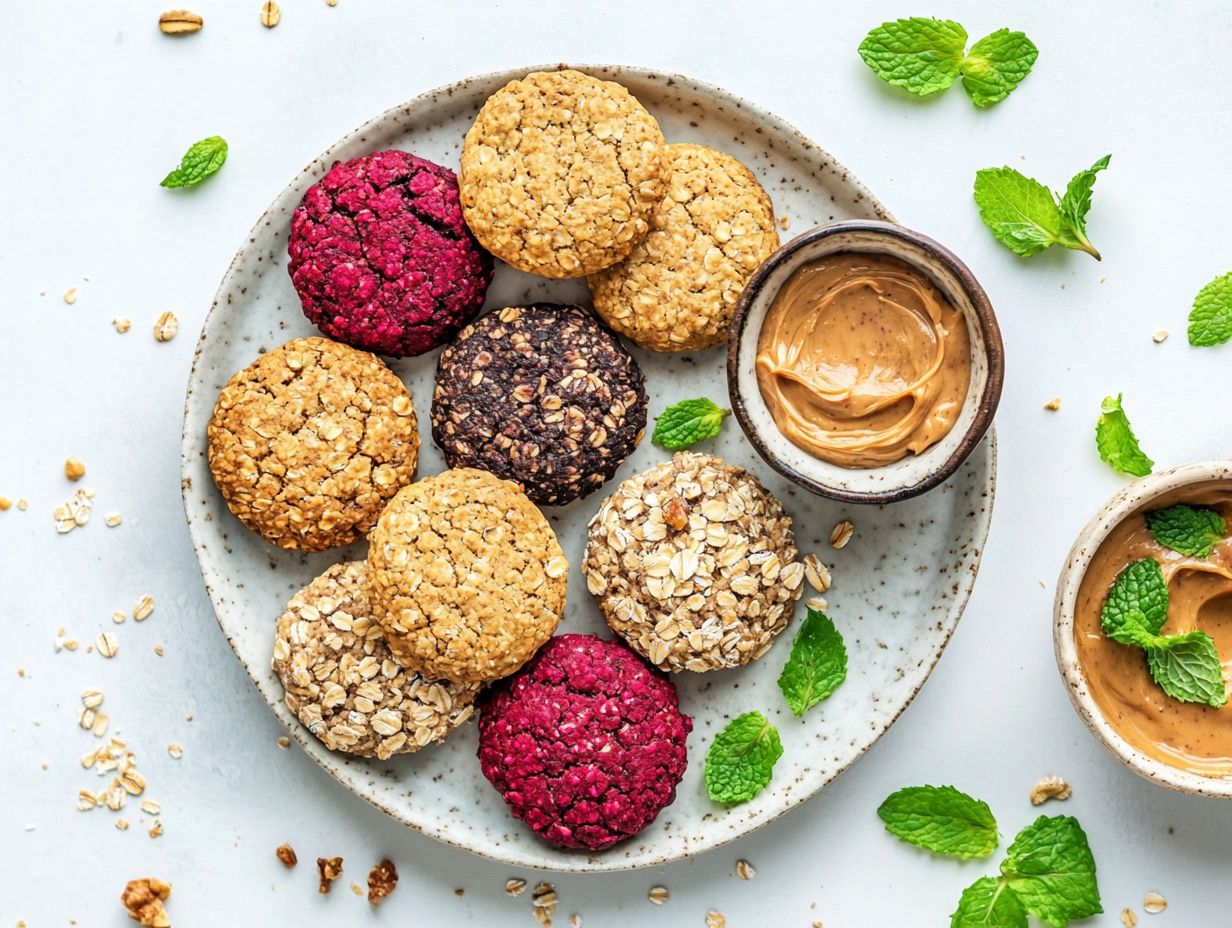
Following the instructions closely is crucial for you to achieve the best results when baking plant-based cookies. Each recipe comes with specific steps, including mixing, baking times, and cooling methods that ensure your cookies turn out golden brown and absolutely delicious. Make sure to use a mixing bowl and consider a food processor for smoother batter.
Straying from these guidelines whether by altering ingredient quantities or skipping steps can lead to a disappointing final product. For example, if you cut the baking time short, your cookies may end up doughy in the middle, while extending the baking duration can lead to a dry, sad outcome. It’s essential to recognize how variations in temperature, humidity, and even ingredient quality and moisture levels can impact your results.
To boost your chances of success, take a moment to read through the entire recipe before you dive in. Measure your ingredients accurately and set your timers this commitment to consistency is what will ultimately ensure that you bake perfectly delightful plant-based treats, whether they are for a post-workout snack or a healthy dessert.
Check out this recipe video to see step-by-step instructions on how to make delicious plant-based cookies. Don t miss this visual guide to elevate your baking skills!
Frequently Asked Questions
Plant-based cookies are cookies made from ingredients that come from plants, such as fruits, vegetables, grains, and nuts. They do not contain any animal products, such as eggs or dairy. Common ingredients include almond meal, oatmeal, coconut, and various butters made from nuts like almond butter. Yes, all plant-based cookies are vegan since they contain no animal products.
Why Are Plant-Based Cookies Considered a Healthier Dessert Option Compared to Traditional Snacks?
Plant-based cookies are healthier because they contain whole, natural ingredients that are free from artificial additives and preservatives. They typically have fewer calories, less fat, and lower cholesterol than traditional cookies.
Moreover, these cookies often provide healthy fats, fiber, and essential vitamins and minerals, making them a nutritious choice.
Are All Plant-Based Cookies Vegan?
Not necessarily! Plant-based cookies can be vegan if made without any animal products.
However, some may still include honey, which is not vegan. Always check the ingredients list to confirm whether a plant-based cookie is vegan.
Do Plant-Based Cookies, Including Vegan Cookies, Taste Different from Traditional Cookies?
You ll find that plant-based cookies bring a unique and delightful twist to your dessert experience! They may have a slightly different taste due to the different ingredients used.
For instance, cookies made with almond flour or flax seeds might have a nuttier flavor. Thankfully, with the right recipe, they can be just as delicious and satisfying as traditional cookies!
Can I Substitute Plant-Based Cookies for Regular Cookies in Baking Recipes?
Absolutely! You can substitute plant-based cookies for regular cookies in baking recipes.
While they offer a healthier alternative, the final taste and texture may vary slightly. For example, using gluten-free ingredients might alter the texture.
Are There Any Health Benefits to Eating Plant-Based Cookies?
Yes, don t miss out on the chance to boost your health with these delicious cookies! They are often low in saturated fat, which is the type of fat that can raise cholesterol levels, and high in fiber, both of which can improve heart health and aid digestion.
Plant-based cookies also provide essential vitamins and minerals from the ingredients used. Furthermore, they can help regulate energy levels and offer immune-boosting properties because of their nutritious components.
Conclusion
In summary, plant-based cookies are a fantastic dessert option that combines health benefits with delightful flavors. Give them a try and enjoy a tasty way to enhance your health!

